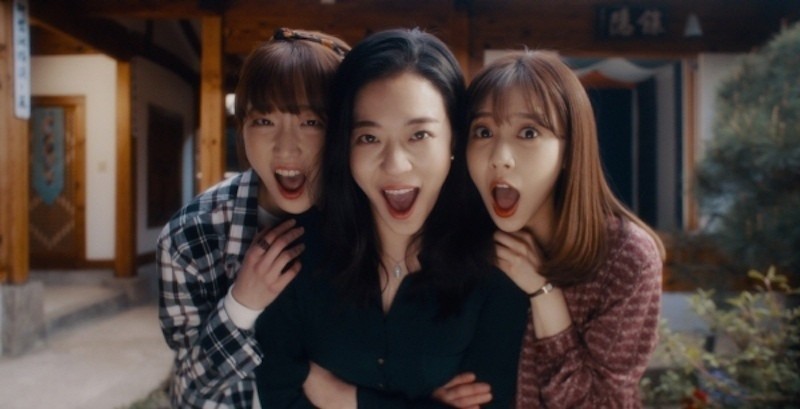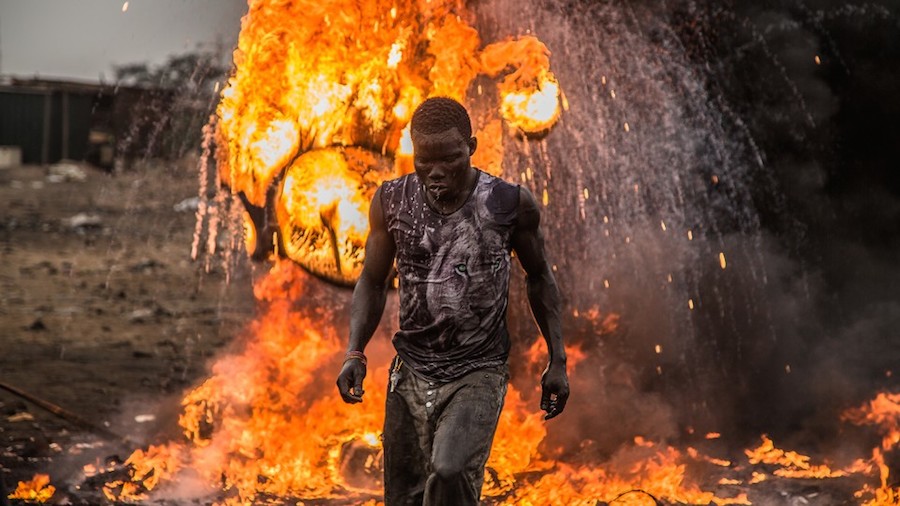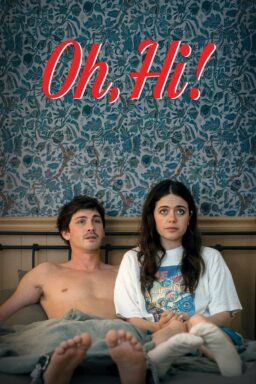If there’s any lesson I plan on gleaning from my time in Iceland, it is to stop hurrying and allow life to move at a slower pace. So laid-back was the waitress at Reykjavík’s Lebowski Bar that I had to chase her down in order to pay my bill. It wasn’t that she was busy, it was that she just didn’t seem all that interested in money. A quartet of Icelandic friends passed the time by quoting “Good Burger” at their table, while Mike Judge’s “Idiocracy” played on a large screen nearby. I had never seen Judge’s 2006 dystopian satire before, and though the volume was off, I found the film’s opening moments to be laugh-out-loud funny and unnervingly prescient, even in their subtitled form. Its slapstick portrayal of a “garbage avalanche” foreshadowed the actual one that killed 17 people in Mozambique a mere decade later, and its hellish imagery isn’t all that far removed from the apocalyptic scenery on display in Christian Krönes and Florian Weigensamer’s Austrian documentary, “Welcome to Sodom.”
Ranking high among the most visually arresting achievements at the 2018 Reykjavík International Film Festival, this impeccably lensed picture takes an unflinching look at the place where our laptops and smartphones will likely end up—a sprawling waste dump in Ghana populated by 6,000 men, women and children. Strewn throughout the rubble are familiar items that had once been commonplace in American homes, such as bulky computer monitors. The sheer wastefulness of our quickly outdated machines currently cluttering a site previously comprised of untouched swampland is enough to make one’s blood boil. By creating technology built to not last but be replaced by newer, more expensive models, we have left a toxic heap of debris for people in impoverished corners of the world to clean up. Cinematographer Christian Kermer opens the picture with a 360 degree panoramic view of the vile landscape, stretching as far as the eye can see. The low hum of the brooding score is so evocative of Paul Schrader’s ode to impending environmental catastrophe, “First Reformed,” that I half-expected to see Ethan Hawke’s tormented priest floating above the mountains of discarded tires. Anonymous inhabitants speak in voice-overs juxtaposed against the footage, each providing an eye-opening perspective on how mankind manages to survive in an environment plagued with disease (at one point, a group of guys perform cathartic dance moves that cause spirals of ash to soar from the ground).
As a fiery preacher spews homophobic rhetoric, a man privately reflects on how his identity as a gay man derailed his chances for a successful career, despite being at the top of his class in medical school. With Ghana’s president voicing his desire to behead homosexuals, this scholar-turned-outcast has resigned himself to a life of self-imposed alienation. For him, the dump is a “temporary safe house” where he won’t be able to run the risk of having anyone get to know him on an intimate level. A more extroverted subject makes his living from breaking down broken appliances so that he can gather their basic properties—copper, iron, zinc—ripe for sale. He admits that the location is good for business despite being bad for humanity. The most haunting narration comes from a child who recalls how mankind’s disrespect of the land has left the gods angry—or, according to Werner Herzog, “monumentally indifferent.” As its last third grows increasingly repetitious, it’s clear “Welcome to Sodom” could’ve worked equally well as a short film. It’s not on the same level as the best documentaries screening at the festival—including Bing Liu’s “Minding the Gap,” Roger Michell’s “Tea with the Dames,” Alexandria Bombach’s “On Her Shoulders” and Mila Turajlic’s Lux Prize nominee, “The Other Side of Everything”—yet there is considerable worth in its extended length. Like the chameleon that haunts the hypnotic title sequence, the film takes its time, moving slowly enough to let us fully absorb the details of our world that we’d normally choose to overlook.

“There’s no such thing as a healthy professional athlete!” claims gymnast-turned-coach Amina Zaripova, spouting one of the numerous quotable if morally questionable lines in Polish director Marta Prus’ documentary, “Over the Limit.” Examining the relentless emotional and psychological abuse endured by Margarita “Rita” Mamun, the celebrated Russian Olympian in individual rhythmic gymnastics, this film causes one to question if her success occurred as a result of—or in spite of—her coaches’ bullying tactics. No tangible evidence is offered as to whether head coach Irina Viner’s mean-spirited demeanor punctuated by four-letter words had any discernible impact on Mamun’s performance, apart from elevating her stress level through the roof. This may be in part because Prus has little interest in the actual gymnastics, providing only fragmentary glances at the routines while keeping Mamun’s pivotal triumph at the 2016 Rio de Janeiro Olympics entirely offscreen. The director’s focus is kept primarily on the 20-year-old subject’s pained expression as she is alternately called a “silly cow” and “brave girl,” depending on how much her effort impresses the coaches. Never mincing her words for the camera, Viner approaches her job like a drill sergeant, believing that athletes cannot be truly built up unless they are broken down. Just as I began likening her in my mind to Parker Posey and Michael Hitchcock’s unstable couple in “Best in Show,” Viner exclaimed, “She’s not wound up! We need to train her like a dog.”
If anything, Mamun appears all-too frenzied in her early routines, lacking the slinky self-assurance of her peer and rival, Yana Alexeyevna Kudryavtseva, whose joy is palpable as she dances to Jessica Rabbit’s crooning rendition of “Why Don’t You Do Right?” Viner is correct in assessing that Mamun’s greatest obstacle stems from her mental state, but doesn’t seem to realize that her own schoolyard putdowns have only further damaged the athlete’s confidence. There are shades of the obsessive theatre director from “Madeline’s Madeline” in how Viner violates the young woman’s personal struggles by contorting them into her artistry. Taking advantage of the cancer diagnosis that has hospitalized Mamun’s father—whom we see the gymnast chatting with on a heartrending phone call—Viner orders her to channel the grief prompted by her “dying dad” into the performance. When Zaripova attempts to show affection for Mamun, she is immediately chastised by Viner. In an ideal world, the notion of an entire country’s well-being hinging on the medals it gains in an Olympic contest would be immediately expunged. The undue pressure it places on athletes like Mamun is criminal, and if there’s anything worth cheering about in this picture, it is the athlete’s heroic composure amidst adversity. After hearing one-too-many disparaging expletives from Viner, streamed into the practice room via a monitor, Mamun tosses her ribbon on the ground and walks out of the gym, much to the protestations of her coach. It’s in that moment, more than any other, where she appears primed to win the gold.

The coveted Golden Egg prize is awarded to the best short film at Reykjavík’s film festival, and I’ve been fortunate enough to view three of the worthy contenders. Tomas Leach’s intriguingly titled “Alba: Not Everyone Will Be Taken Into the Future,” is also about a young athlete—in this case, an aspiring dancer—though its style is more in line with “Welcome to Sodom,” allowing the recorded voice of its subject to anchor its assemblage of near-wordless footage. At age 16, the titular girl is already facing the perils of pushing her body to the limit, keeping up with her classes at Spain’s Corella Dance Academy despite a conspicuous pain in her legs. There are no tidy solutions to any of Alba’s lingering questions, as she ponders whether life is simply testing her to see how much she can take. Leach’s vignette recalls how the closure we seek in adulthood never existed in our youth, which was often consumed with a sense of discomfort as our future hung preciously in the air. Another highlight is Hakan Ünal’s Turkish submission, “Crack in the Wall,” a chillingly bleak look at a night-shift janitor’s futile pursuit of spiritual repentance. Wracked with guilt after awakening from an erotic dream, the man bathes himself as the camera stares down at him in stark judgment. Though the film initially seems to be a portrait of sexual repression, a final twist—deftly conveyed by the recurring image of red fingernails—affirms that a much darker sin has been committed.
Easily my favorite short I’ve seen in Reykjavík also happens to be the festival’s unlikeliest crowd-pleaser. South Korean director Heui Son’s 18-minute gem, “Daughter’s Table,” follows three adult sisters as they rush to their mother’s side after receiving news of her ill health. While together, they find themselves falling prone to the same sibling rivalry that characterized their upbringing. This premise would be compelling enough if handled as a straightforward drama, yet Son’s picture takes the form of an exuberant musical comedy, with the sisters breaking into song as they vie for their mother’s approval. The childlike spirit of the piece is appropriate, considering how nothing brings out a grown-up’s inner kid quite like visiting a former home marked by lines on the wall that had previously measured one’s pint-sized height. A trio of girls portraying the younger versions of the sisters are each represented by a bright color that corresponds with their teddy bears spotted in the background. The bouncy music and pleasingly unpolished choreography make this film a complete delight, carrying traces of the poignance perhaps best expressed during the finale of Isao Takahata’s masterpiece, “Only Yesterday.” How Son goes about resolving the mother’s storyline as she’s surrounded by her children is an indelible example of pure cinema. Rather than treat difficult subject matter with the heavy hand of a morose dirge, Son crafts a celebration of life, encouraging us to savor the time we share with loved ones, as well as the memories destined to last for generations.












